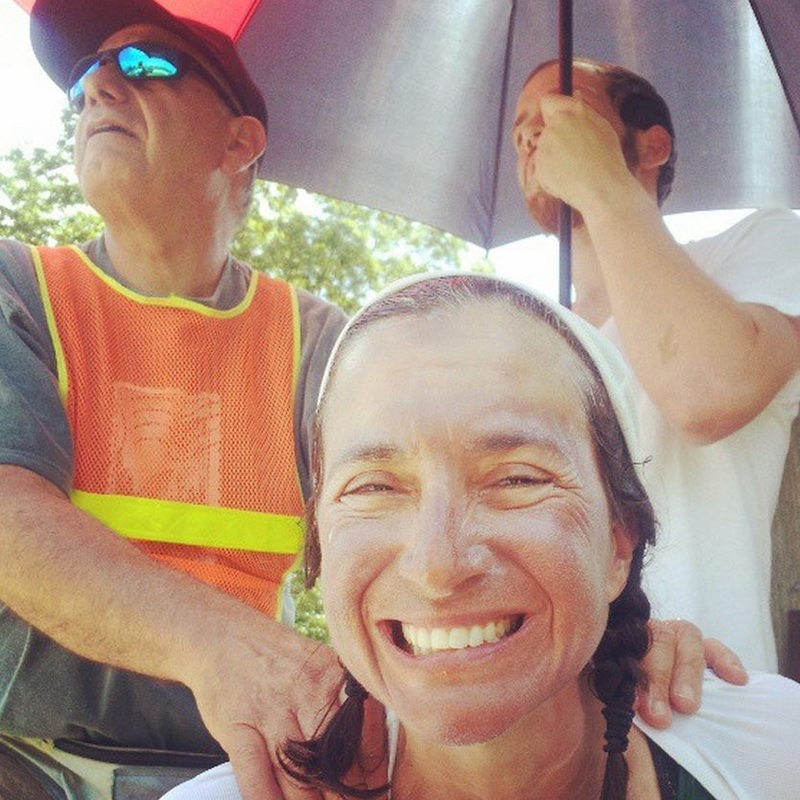Racing Across America
 The media team and I set off, feeling like we were getting good at the pattern of what the race held for us: sleep, wake, catch up with Maria, take videos, photos and get interviews, then race ahead and find a motel with WiFi so we could update Facebook, write press releases, and send out emails about the race.
The media team and I set off, feeling like we were getting good at the pattern of what the race held for us: sleep, wake, catch up with Maria, take videos, photos and get interviews, then race ahead and find a motel with WiFi so we could update Facebook, write press releases, and send out emails about the race.
But we immediately got stopped in traffic behind an RV outside of Tuba City. I could see that the RV was a support vehicle for a fellow RAAM racer, and when I saw some of the crew for that racer get out of the vehicle, I decided to go investigate. There had been an accident, the crew told me in their German accents.
They asked me to call 911, so I did. They said "one injured." I glanced up the road and saw a Native American woman sitting in the middle of the road with glass all around her. The German crew members were trying to attend to her as best they could.
I ran back to the media car to give the 911 operator directions about where we were, and then I ran back to the scene of the accident. It was only then that I saw, up ahead on the road, our team's follow vehicle, with the bicycles on the rear smashed in, and our crew sitting on the side of the road.
We'd been hit.
 I ran up to our follow van, and immediately saw that my mom was safe, and our crew was okay. My brother Will had blood running down his arm and leg, and had a swelling spot on his head, but he was smiling and joking.
I ran up to our follow van, and immediately saw that my mom was safe, and our crew was okay. My brother Will had blood running down his arm and leg, and had a swelling spot on his head, but he was smiling and joking.
My heart soared with gratitude. My family and team was okay.
The driver who'd hit us was okay too. Onlookers speculated that she was in shock from the inflation of the airbag, but that other than that, there were no major injuries. I speculate that she may have been drunk or high, because the driving conditions that day were nearly perfect. The sun was behind her, still high in the sky, the road clear and straight. The follow vehicle was plastered at every angle with warning signs and flashing lights. She told the police she'd been texting right before hitting the van.
Our crew chief immediately called RAAM officials to pull us out of the race, despite my mom's desire to keep racing, and over my protests to wait until morning to make a decision. I knew it was a long race. I knew we had many supporters willing to meet us anywhere, and send us anything. I knew that the middle of the road, with glass and bike parts scattered all around, and three crew members with bleeding wounds, was not a good place to make a clear-headed decision. But our crew chief made the decision, and we gathered as a team, supporting this decision.
Still, as we all sat, dazed, in a hotel lobby discussing where we would sleep and what the next steps were, my heart was heavy. I felt alone in my optimism that we could continue the race. Everything I believed about rising above obstacles, about continuing despite setbacks, about persistence and heart and fighting it out, Rocky style, was failing. One distracted driver, and the race was already over. I couldn't believe everyone was willing to give up so easily. Maria would later say, "What message would we be sending to cancer patients if we quit? What would we be saying to cancer researchers?" I couldn't believe we were letting down brain cancer patients in hospitals all over the world.
During the 90-minute car ride back to Flagstaff with some crew members, I tried discussing the possibility of continuing the race. Each team member in turn stated the reasons they thought it was impossible or ill-advised to continue.
Little did I know that in less than 24 hours, those same team members would be rallying around Maria as she got back on the race course and began to outpace all the competition. They'd figure out creative solutions to all the problems that had loomed so large the night before.
In the morning, Maria hosted a listening session, where each crew member got up and spoke about their ideas for what the cause, 3000 Miles to a Cure, would now look like and their part in it.
Earlier that morning, Maria had been brainstorming with various team members at home and on the road. She wanted to keep going, somehow, even though she knew she was out of the race. She decided that somehow, she'd cycle 3000 miles, even if it took longer than the allotted race time.
After the morning session, several of the most traumatized crew members, including our crew chief, decided to go home. Everyone else said "I'm in," and we talked about what Maria's ride would look like now that it wasn't a race.
Meanwhile, mom, my dad, Jim, and our new crew chief Ted took mom to the junk lot where they tried to salvage tools and equipment from the totaled follow van. The plan was to drive Maria up the road, past the dangerous stretch where we'd been in the accident. She'd make up the distance later.
But then Maria said "I want to start where we stopped."
And she did. One quick call to race officials, and she was suddenly back in the race.
The media team and took on additional crew duties, so that we were not only documenting what happened, but we were helping Maria race. The remaining days of the race blur together in a haze of anxiety, adrenaline, and fast food. At night, I awoke to the sound of her keen moans as the pain shooting through her body briefly interrupted her alotted three hours of sleep.
There was also the extreme joy of seeing supporters, many of whom had driven and waited for hours, cheer for her from the side of the road. There were so many kind strangers on the route. My heart overflows thinking about all the people who lost sleep, who baked on the side of a hot road, who gave money to the cause and food and shelter to us.
In the year that this blog has been in existence, I have never skipped a scheduled publishing day. That is until two weeks ago, when, in the above-mentioned blur, I forgot to post. I hope this heavy-duty post makes up for it.
The sweetest moment during RAAM was when mom came into the Shell Gas station that marked the end of the her official race. She had almost given up, but that didn't matter. What mattered was she kept going, pushing one pedal down, and then the other. Until she made it.
 My sister and I got her ready for her parade finish - the last four miles of easy riding to the FINISH canopy by the dock in Annapolis, Maryland. Oh the joy.
My sister and I got her ready for her parade finish - the last four miles of easy riding to the FINISH canopy by the dock in Annapolis, Maryland. Oh the joy. Unbelievably, despite a 24-hour setback, she won overall Women's Champion. She also won Rookie of the Year, the Trane Unstoppable Award, and Queen of the Prairies.
Unbelievably, despite a 24-hour setback, she won overall Women's Champion. She also won Rookie of the Year, the Trane Unstoppable Award, and Queen of the Prairies. I'm so proud of her, and proud of the money we raised for brain cancer research. If you've been following this blog for a while, you know where you can donate and learn more.
I'm so proud of her, and proud of the money we raised for brain cancer research. If you've been following this blog for a while, you know where you can donate and learn more.
I'm so grateful to every member of the team. Each person added something important. Those cheering from home added more than they know. Facebook comments got my mom up those last few big hills in West Virginia and Maryland. I talked to her and read to her through her headset system, so I know that she almost gave up many times. Hearing from the people cheering for her all over the world is what kept her going.
To my mom: I'm so proud of you for choosing to do something so challenging, for continuing despite setbacks, and for winning the race even when there were people who thought you couldn't do it. You showed the world what heart looks like. I know you didn't do it for the glory; you did it for your sister Jenny, and for cancer patients all over the world. RAAM official media commentators said you had the "heart of a lion" and that yours was a "Cinderella story." It's not always easy being a lion-hearted Cinderella, but you pull it off beautifully. I love you Mom.

